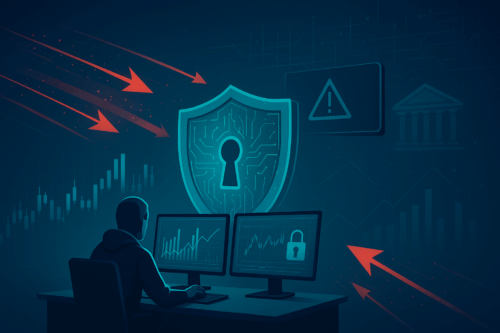
A New Kind of Threat to the Market
Cyber warfare has become the new battleground for nations and their financial institutions. The National Stock Exchange (NSE), India’s largest stock exchange, is now at the center of this invisible war. Officials revealed that the NSE faces nearly 17 crore cyberattacks every single day, making it one of the most targeted digital infrastructures in the country.
The Massive Cyber Siege: ‘Operation Sindoor’
In a striking example of the scale of modern threats, the NSE endured 40 crore cyberattacks in one day during ‘Operation Sindoor’ — a simulated DDoS (Distributed Denial of Service) exercise designed to test its defense systems. Despite the intensity, the attackers failed to breach the exchange’s systems. Thanks to a robust security setup and coordinated efforts, trading operations continued without disruption.
Round-the-Clock Cyber Defence
To stay ahead of attackers, NSE maintains two 24/7 cyber defence centres. These teams, often called “cyber warriors,” work continuously to detect and neutralise potential threats. Using advanced monitoring tools, upgraded software, and AI-based alerts, they ensure uninterrupted market operations — a crucial requirement for investor confidence.
Multi-Layered Cybersecurity Measures
NSE’s cybersecurity framework includes strict internal protocols that limit external data sharing, email access, and use of pen drives. Each activity passes through layers of monitoring. If a suspicious action occurs, the system immediately generates pop-ups and alerts for investigation.
The exchange also conducts regular cybersecurity audits for its staff and trading members. Through the NSE Academy, it runs a Cybersecurity Fundamentals Training Program, ensuring that stakeholders understand evolving risks.
Understanding the DDoS Threat
A DDoS attack floods servers with massive traffic, making systems crash or go offline. For financial institutions like NSE, such attacks could disrupt trading, impact prices, and hurt investors. To counter this, NSE’s defences include advanced traffic filtering, automated load balancing, and real-time response systems.
Resilient Systems and Backup Protocols
Even in the event of a severe attack, the NSE’s operations can shift to a fully functional backup setup in Chennai. This backup is self-activated through a secure digital procedure and can take over trading activities seamlessly. Officials say that the system can correct minor faults automatically, requiring minimal human intervention.
Staying Vigilant Against Global Cyber Risks
The NSE’s leadership warns that growing interconnectedness across systems makes the entire financial ecosystem vulnerable. A single breach could trigger a ripple effect across linked platforms. With global cyber threats increasing and attack costs dropping, exchanges worldwide are treating cybersecurity as a core operational priority.
A Constant Digital Battle
While trading floors may appear calm, a silent digital battle rages behind the scenes. For the NSE, defending against crores of daily cyberattacks has become routine — a reminder that in today’s markets, cybersecurity is the new foundation of trust.
